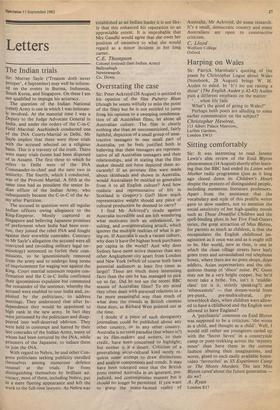Sitting comfortably
Sir: It was interesting to read Jeremy Lewis's able review of the Enid Blyton phenomenon (14 August) shortly after learn- ing that the BBC had ended its Listen with Mother radio programme (just as it long ago closed down its Children's Hour) despite the protests of distinguished people, including numerous literature professors. Apart from the assistance that the vocabulary and style of this prolific writer gave to slow readers, not to mention the social sensitivity of her high-quality novels such as Those Dreadful Children and the spell-binding plots in her Five Find-Outers series, the great attraction of Miss Blyton, for parents as much as children, is that she encapsulates the English childhood im- agination as it once was and as it ought still to be. Her world, now as then, is one in which the clean village streets have leafy green trees and unvandalised red telephone boxes, where there are no porn shops, dope addicts, Asian supermarkets and the ubi- quitous thump of 'disco' noise. PC Goon may not be a very bright copper, but he'd never take a bribe. Yes, isn't it 'middle- class' (or is it, strictly speaking?) and `ethnocentric' — that dream-world from pre-punk, pre-multicultural, pre- towerblock days, when children were allow- ed to have a childhood and the English were allowed to have England?
A 'psychiatric' comment on Enid Blyton was supposed to be a criticism: 'she wrote as a child, and thought as a child'. Well, I would still rather see youngsters curled up with the 'Secret Seven' in a countryside camp or pony-trekking across the 'mystery moor' than have them in the current fashion abusing their imaginations, and worse, glued to such easily available home- video 'favourite as SS Experiment Camp or The Moors Murders. The late Miss Blyton cared about the future generation do we?
A. Ryan
London E17


































 Previous page
Previous page